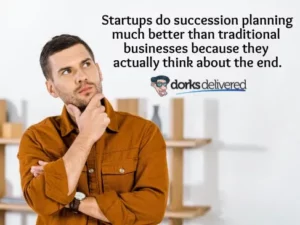Have you ever thought about what you’re going to do with your business in the future? Do you have a plan on how you would exit your business?
Cameron McMillan from Creating Succession and Right Hand Advisors joined Josh to discuss exactly that. He has more than 25 years of experience in the banking and financial sector, and he specialises in evaluating business performance and identifying improvement areas in various industries.
Why Do You Need a Business Succession Plan?
At the end of the day, everything comes to an end. It’s better to plan the nature in which you depart your business rather than have life impose itself upon you. There are a lot of businesses and business people out there that unfortunately are obliged to exit their business because of health reasons, financial reasons, or even just lack of motivation at the back end of their careers.
It’s much better to prepare and plan for it than to wake up one day and be in a situation where you can’t contribute to the business because of some other limitations.
Get started in building a repeatable business system so your business no longer relies on you and you can have more time. Let’s talk!
How Do Old and New Businesses Prepare for Exit?

Are there a lot of businesses out there that should be thinking about succession planning right now? Absolutely. We’re going through the biggest intergenerational transfer of wealth in history and the substantial amounts of value and wealth tied up inside of small to medium businesses in Australia.
Options for Exiting a Business:
- Sell to a third party
- Internal succession
- Stick your head in the sand and do nothing. This is when people end up working much longer as owner-operators inside of their businesses.
Business Owner vs Business Investor
It’s not as simple in the sense that you’ve got this sort of category of people who are business owners, not thinking about the investment side, and the business investors or entrepreneurs. There’s obviously a blend.
Often, people in startups are entrepreneurs. They’re entrepreneurial in terms of what they’re trying to achieve. Everyone needs to think more like an investor and an entrepreneur to adequately plan for your exit from a business. I often tell people that running a business doesn’t necessarily qualify you particularly well to exit that business or to sell that business. Often, it’s something that’s only ever done once in a person’s life.
Enjoy time freedom! Talk to a dork today about getting more time to work on your business, not in it.
As a business owner, you focus on acquiring clients, acquiring staff and assimilating those staff and your business, setting up processes and systems, and cash flow. That doesn’t necessarily translate well into how you extract yourself out of that business, particularly when in a lot of small or medium businesses, the owner is the centre of the universe and everything revolves around them, which is completely okay as a going concern but it’s quite problematic when you’re thinking about exiting.
You must start thinking more along the lines of an investor and an entrepreneur rather than a business owner.
Create a Reputable System
I went to a training session about the startup ecosystem in Australia 7 years ago. I went in a bit cynical, but the guy got me in the first 5 minutes because he talked about entrepreneurship as not the act of coming up with an idea but the act of coming up with a repeatable business system. It changed my perspective suddenly.
Creating a repeatable business system means reducing the reliance of the business upon you, the business owner, and then that creates value to a third party or hopefully, multiple third parties.
The first question any third-party purchaser asks in relation to investing in a business or acquiring a business is, “What’s the owner doing?” The second question is, “How reliant is this business on the owner?”
Unfortunately, the answers to those two questions often end up resulting in a pretty slow process. It often creates a situation where the owners end up putting their heads in the sand a little bit because the business is heavily reliant upon them. That creates real issues around value.
Growing your business is not enough. Make it a recurring revenue business. Talk to a dork today!
Creating Succession vs No Successor
When creating succession, the business solution that we’re offering there is acknowledging that in a lot of businesses there is no successor. A successor may be someone who has elements of the skills and the experience to be able to replace the owner, but not all of it. So the question is can we develop that person in an adequate time frame?
Sometimes, there is no solution inside of the business from a succession perspective. Do we need to go out and look for someone who has a broader skillset and might want to come in as a partner? Sometimes, going out and finding that person is really challenging.
What Drives Value?
Most businesses in Australia sell in that range of two to four times. But you must stop and think about those two to four times. Four times is twice as much as two times. How do you get to four times?
There are drivers of value: consideration, risk, and reward. Often, there are situational factors depending upon the time that you’re selling. Sometimes markets are more buoyant. Your preparedness for sale will also influence the consideration that you can receive.
But if you think about return—the profitability that a business is making—the risk piece in the mind of a purchaser is a question of how repeatable it is. How likely is that return to reoccur in the future? Is it going to be less, is it going to be more, or is it going to be the same?
The contracted income certainly helps. The client composition is certainly something that is part of a sophisticated investor’s due diligence process. Alternatively, they may also wonder if there is any unhealthy concentration with this contracted revenue. For example, your biggest client is 40% of the revenue and that contract expires in six months, so in the absence of that client, you’re unprofitable or you’re a breakeven business at best—not ideal.
Expertise can play out in different ways. Someone with negligible experience probably expands the pool of potential demand, so often, you end up with a situation where those businesses can actually extract higher levels of multiple because the pool of buyers is larger, but it doesn’t play out in that way.
Does your business heavily rely on you? Systemise your business today!
Emotion and Mindset
Emotion is often the biggest barrier. In extreme situations, a highly productive business owner who hangs on too tight to the business can be its biggest asset and its biggest liability, the driver of the business value but the biggest issue in terms of the exit phase.
How do you go through that process? Sit down. It’s a simple planning exercise, and you need to work through a situation that takes account of where the business is now and where you want to be.
If you sit there and think about what you would like to change in the future, there’s some motivation. It can be that the business is worth a million dollars, and you’d like it to be worth 3 million, or you’re happy with the value of the business but you’re working 70 hours a week and would like to change that.
Return, Risk and Effort
Return, risk and effort with clients are the three big factors that a business owner should be thinking about. So, let’s take an assessment of where that’s at, and then let’s talk about a period in the future. Is that 3 years, 4 years, or five years? Where do you want to be?
You’ve got to be motivated. If the status quo has some issues, but they’re tolerable issues, such as people aren’t motivated to change, I’ll often try and scratch away at that and focus on “your business is worth a million dollars and you want it to be worth $3 million.” The things that are going to drive that are higher levels of profitability and lower levels of risk in the eyes of a purchaser. The risk might be about you being the cog. We can make this business more profitable, but alternatively, at the moment, we probably think it’s two. How do we get to four?
We need to make this business systemised so that it is not relying upon you. That sometimes still doesn’t get there because sometimes people want to control that situation and aren’t comfortable with that process. Some people are really up for it. Others have different levels of tolerance for that risk.
What are the obvious things that we need to get out of your life or get you away from? Often, business owners are still dealing with stuff they shouldn’t be dealing with. They’re the easy things like doing accounts on the weekend.
But if there isn’t motivation around how you want to change your life or your circumstances to achieve an outcome, it’s really hard.
Talk About Roles in Your Business
A common blocker in people’s mindset when talking about succession planning and exit, they think quite in a binary fashion—I’m either here or I’m not.
You must talk about roles. Business owners often have multiple roles in the organisation. They play the role of an executive, an owner, and a director.
A director may have a reasonably insignificant requirement. If you’ve got an advisory board, it may be more significant, but you start to talk to them about time frames around those three roles. Operationally, you’re working 70 hours a week, and we want to scale that back. That doesn’t necessarily mean that you’re reducing your obligations or requirements as a director or an owner, but you can exit some of those roles at different times.
You can stop working inside the business in the next two years by bringing in a general manager who’s going to pick up all of your responsibilities so you can have an orderly transition that’s planned out. You’re still the owner and a director, and it might be a couple of years after that you actually want to exit the business.
I find that people have quite a basic view of life—exit means I’m out. But it doesn’t have to mean that completely; it can mean an orderly, gradual transition.
In some respects, one could argue that a sale to a third party is a riskier proposition than a sale to someone who’s working inside of the business because of all of the insights that come with that.
If you have a successor or a group of successors—it might be a management team to pick up the responsibility that an owner has now—one could argue that an internal sale is going to enable a slightly higher value potentially and a much more orderly transition with less disruption if handled well.
Whether you’re planning for business growth or for succession, our dorks can help. Turn IT into a utility!
Due Diligence
There are lots of things that you can do. Due diligence in finance is a big part of it, but there’s a broader series of works that you can go through from a due diligence perspective. You can have your lawyers involved in that process. At its core, due diligence is asking questions and receiving answers that address the questions that you might have.
Trust the Person
At the end of the day, it’s about trusting the person that you’re doing the deal with. If you know them or you know people who know them and they can provide you with some sort of insight in terms of their business ethics, that clearly helps.
Condition the Contract to Mitigate Risk
You can also contract in a way to mitigate risk. Going back to the example of the 40% revenue is a single client with a renewal in six months’ time, one would think that it would be conditioned in some way, shape, or form associated with any transaction such that if you were the buyer, you’re not actually outlaying money for something that isn’t there in six months’ time.
When I used to go to conferences back in my banking days, the most common question that people would ask is, “What are businesses selling for these days?” But the answer is, “it depends” because you can get multiples up through substantially conditioned deals.
Deals that have substantial risk mitigants enacted as part of the contract can result in high levels of consideration, but they are conditional. Deals that are walk-in-walk-out, such as you write me a cheque and the business is mine on a Friday and the business is yours on a Monday, you don’t have to be that well versed in business to understand that the multiple there is going to be substantially lower because the risk is all on the buyer.
Focus on what matters most. Find out how you can turn IT into a utility so you can have more time to work on your business.
How to Write a Simple Succession Plan
From a management succession perspective, when I work with business owners, we look at the burdens inside of their business that they’re responsible for and whether they should continue to be responsible for those things.
Is that important to the business? Are you the best person to continue to do that? If the answer to those questions is no, then someone else should be doing it.
A slightly broader way to think about that is to look at the core things. What are the core processes or tasks inside the system that we must do well?
Most businesses have to acquire clients. How do we go about sales and marketing? Once you’ve got those clients on, how do we service those clients? Most businesses, particularly as they grow, have to acquire, induct, train, and develop staff. Depending upon the nature of the business, there might be other elements that are important, such as research and development.
Think about your business in terms of the core parts of your business that you need to do. Have a look at the way that you’re going about them from a process and systems perspective. Think about how it should look, how reliant it is upon you, and how we can make this repeatable.
Think in Advance
We’ve touched on some of the other elements that you should be looking at, that is, where is the business now and where do we want to be after a certain timeframe. I think three to five years is as far as people can genuinely think in advance.
Is the business operating well and it’s about reducing reliance on the owner? Alternatively, do we need to improve the business off the back of that? I think the other thing that you’d want to incorporate in terms of a succession plan other than an understanding of the tasks that people have to do, is what are the priority tasks?
Keep in mind it’s a three to five-year plan, so you don’t have to do everything straight away. One of the most important things to do first is to think about who your advisors are. Is it an accountant? Is it a lawyer? Is it an external adviser that’s going to help you along the way? Is it a valuer to come in and do something to give you a sense of where the business is if you’re not sure? The critical part of that is to capture a whole lot of information about the business, where it is now, where you want to be, and the first thing that you need to focus on from a valued driver perspective. In my experience, it often revolves around the owner because the owner is often the obstacle to moving ahead.
The Pareto Principle
There are hundreds of things that every business needs to fix. Every business has hundreds of problems, some of which could be as inconsequential as there’s something wrong with the business website. But is that genuinely impactful?
The point is to sit back and acknowledge that we can only do a handful of things and think about the handful of things that are going to advance you over the next 12 months the most. If you want your business to work three times as much as it is now in five years, what’s going to drive that in the most impactful way?
I’m a big fan of the Pareto principle—20% of what you do creates 80% of the value. It helps to think about that. Sometimes, it helps you to get some external advice on that because once you’re in the business and your neck deep, it’s hard to discern between the important and the not so important.
If your challenge is growing the business as part of your exit and succession planning because you need high levels of revenue to generate high levels of profit, there are lots of options out there. You probably have to brainstorm about the various things that you can do, leverage your experience in some respect so that you can say what you’ve tried and what worked, leverage the people inside the business, and leverage your advisers outside of the business to try and work out a plan in terms of how to best move things forward.
Succession planning gives you options. A lot of my clients say that in three to five years they’d like to be in a position where they are able to exit, but they just want the choice. Often, that ends up with a situation where they have a good business that’s less reliant upon them, that’s more valuable, and they continue to be involved in a certain way.
Ask Cameron!
Cameron McMillan has more than 25 years of experience in the banking and financial sector. He is an acclaimed leader in evaluating business performance and identifying improvement areas in a wide range of industries.
When he recognised the demand for experienced business advisory for independent industries, he founded Right Hand Advisors in 2017. The company has earned an enviable reputation as a provider of pragmatic, corporate strategy, achieving outstanding value results.
If anyone out there is looking for some advice and how to work out how to better their business, Cameron is more than happy to talk to you. Catch up for a coffee or go through a 15-minute business health cheque to see where you’re at.






























